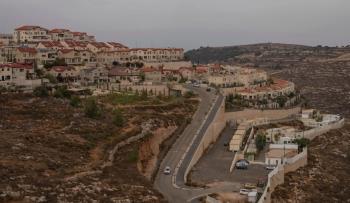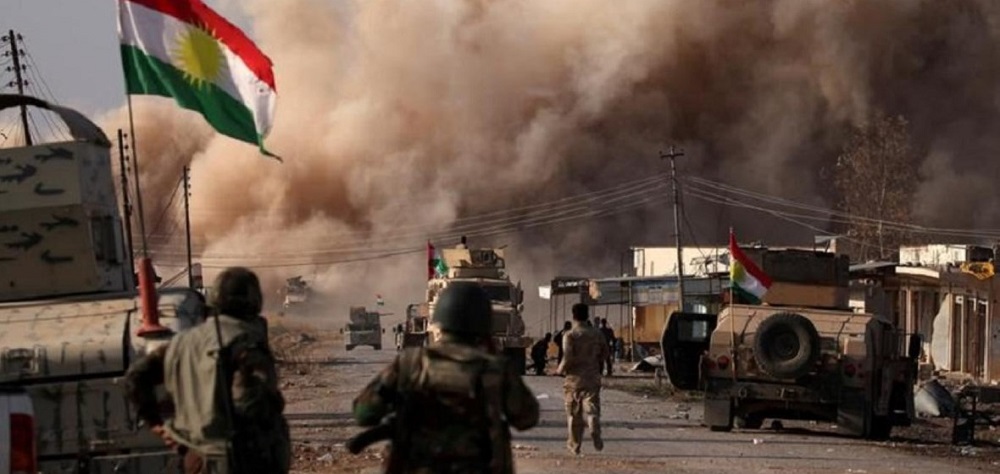Alwaght- Despite the growing political and economic competition between the Kurdistan region of Iraq and the central government in Baghdad, in recent months security differences have overshadowed their bilateral ties. On Sunday, minor clashes occurred between the Iraqi army and the Kurdish Peshmerga forces over control of checkpoints near Makhmur camp for the Kurdish refugees. Iraqi sources said that the Peshmergas, affiliated with Kurdistan Democratic Party (KDP), pushed to retake control of this region, sparking clashes with the army. As a result, two army soldiers and a Peshmerga fighter were killed and 6 army soldiers and 5 Peshmerga fighters were injured.
Military sources and Peshmerga forces said the clashes continued for about two hours before the situation calmed down as leaders of both sides tried to defuse the tensions. However, military sources said both sides were sending reinforcements to the region, describing the situation as fragile. Three Iraqi military sources said army forces still control the mountainous areas.
These clashes started after the terrorist group of the Kurdistan Workers’ Party (PKK) evacuated its positions near Makhmur on Saturday. After the announcement of the withdrawal of PKK from the town, the forces of the 14th division of the Iraqi army filled their place in the area. But the Peshmerga forces also claimed the right for controlling these evacuated areas.
Makhmur camp is a mountainous area about 70 kilometers southeast of Mosul and 60 kilometers southwest of Erbil, and more than 12,000 people live there. It is a part of the lands claimed by both Baghdad and the Kurdistan region. The area has been a point of contention between the two sides for years, as the Kurds have sought to annex the oil-rich province of Kirkuk and other areas into the autonomous Kurdistan region, a move strongly opposed to by Baghdad.
Armed clashes between the army and Kurds occurred in Makhmur in 2017, when Iraqi government forces launched a surprise attack on the region in response to the Kurdistan region holding an illegal independence referendum.
Makhmur, which was the headquarters of the PKK, has been targeted by Turkish fighter jets many times in recent years, and the central government is trying to prevent it from becoming a place of conflict between Kurdish groups and neighbors by gaining its control.
Erbil and Baghdad seeking de-escalation
Despite the minor clashes, it seems that tensions have de-escalated and Erbil and Baghdad leaders are working to assuage the dispute. Immediately after the start of the fighting, the Prime Minister Mohammad Shia al-Sudani ordered formation of a fact-finding committee and investigated the circumstances of the incident at the highest level to determine the circumstances and the victims.
“All leaders and commanders at all levels, both from the federal government and from the Peshmerga, must exercise self-restraint and act with full tact, prioritize higher interests, and strengthen common interests, and take the opportunity from the enemies of Iraq,” said the PM.
For his part, the chief of general staff of the Peshmerga expressed his regret for the incident.
“We emphasize our commitment to cooperate with the Baghdad government for a root and lasting solution for the issue— a solution that will establish security and stability throughout Iraq, and we support the approach to conducting rapid investigations,” the statement said.
According to the security agreements between Iraq and Iran to remove the Kurdish separatist groups from shared borders, the task of establishing security in the areas previously held by the PKK and other terrorist groups has been assigned to the army, and there are also agreements on the issue between the leaders Baghdad and Erbil.
Baghdad and Erbil have boosted military cooperation in the border areas and to fill the security gaps in the disputed areas, especially Kirkuk and Nineveh north of the country. However, differences over border areas known as “green line areas”, which are the administrative borders between Kurdistan region and other provinces of Iraq, continue.
Disputes in these areas are described as “chronic” and calls for constitutional amendments to ensure an end to the security crisis have been made from time to time, but have so far failed to achieve a fundamental solution.
Since the time Baghdad and Erbil engaged in cooperation, including launching joint military operations, this is the first incident of its kind. Cooperation between al-Sudani’s administration and Erbil has been shored up over the past year and they even reached agreements over the federal budget that Baghdad cut off from Erbil since 2014, and they say their security cooperation will be bolstered.
US exploiting the situation
There is no doubt that any difference in Iraq provide an opportunity to the US to implement its evil schemes by taking advantage of developments. The clashes between the Kurds and the Iraqi army took place in the circumstances that in recent days in response to the crimes of the US ally the Israeli regime in Gaza and in support of the Palestinians, the Popular Mobilization Forces (PMF) struck American military bases of Ain al-Assad, Harir, and Victoria in Iraq and Al-Tanf, Koniko, and American-controled Al-Omar oilfield in Syria, triggering the White House worries.
Given the American record of division sowing in Iraq, this time, too, the Americans have seen the opportunity ripe for interference amid clashes over the disputed areas. The Americans know that the Iraqi military involvement in a conflict with the Kurds will tie down the PMF as the guarantor of the Iraqi security. This will keep the American occupation’s bases away from attacks. Some sources reported deployment of part of the PMF forces to Nineveh to prevent more clashes.
Therefore, it is not unlikely that the Americans have incited the current crisis at the present conditions to distract the PMF from Gaza developments. Al-Sudani’s emphasis on the end of the clashes to take the opportunity of exploitation from the enemies shows that the Americans are lurking to take advantage of such disputes. The White House officials have been attempting to impair the resistance groups in Iraq for years, and they consider the rise of these groups as a threat to their long-term presence in the country. That is why they always put pressure on the central government to make cuts to the PMF budget and separate them from the regular army. However, these attempts have gone nowhere so far.
Just against Washington’s will, the resistance groups not only have been active in the security field, but also they have gained major political weight and are now recognized as the guarantors of the nation’s security and political stability and their popularity is thriving day by day.



























